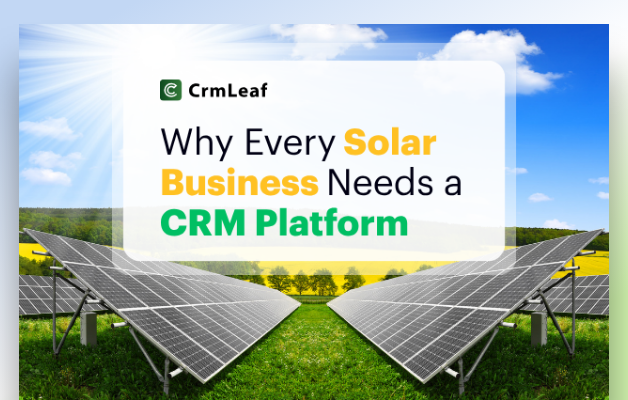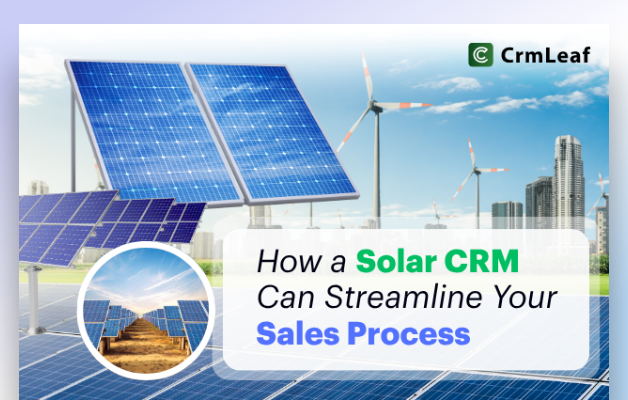The solar industry is experiencing explosive growth. From residential rooftops to large-scale solar farms, demand for clean energy solutions is rising fast. But with that growth comes complexity — more leads, more site visits, more quotes, and more customer interactions. Managing it all manually or through spreadsheets is a recipe for missed opportunities and operational headaches.
That’s where a Customer Relationship Management (CRM) platform becomes a game-changer.
In this post, we’ll explore why a CRM is essential for every solar business, how it streamlines operations, and the long-term advantages it offers.
The Solar Sales Cycle is Unique (and Complicated)
Unlike e-commerce or retail, the solar sales process is long and layered. It often involves:
- Educating the customer
- Assessing site suitability
- Generating personalized quotes
- Handling permitting and financing
- Coordinating installation
- Post-installation support
Each of these stages requires precise coordination between sales, technical teams, operations, and customers. A missed follow-up or miscommunication can delay a project, or worse, lose a sale.
A CRM brings structure to this chaos. It ensures every lead is nurtured, every task is tracked, and every customer receives timely updates.
1. Centralized Lead Management
Most solar companies generate leads from multiple sources—Google Ads, Facebook campaigns, referral programs, solar expos, and their websites. Without a centralized system, it’s easy to lose track of where a lead came from or how hot it is.
A CRM automatically captures and organizes all leads in one dashboard. Sales teams can:
- Assign leads based on geography or availability
- Set follow-up reminders
- Track lead status (new, contacted, quoted, converted)
- Prioritize high-value prospects
This ensures no potential customer falls through the cracks.
2. Faster, Smarter Sales Processes
Solar customers expect prompt quotes, site assessments, and clear communication. A CRM shortens response times by automating repetitive tasks and providing sales teams with quick access to templates, pricing, and customer data.
Some CRM platforms also integrate with tools that generate solar proposals automatically based on location and usage data, saving hours of manual work.
As a result, your sales reps spend less time on admin work and more time closing deals.
3. Improved Customer Experience
Solar installations aren’t impulse buys. Customers often need education, reassurance, and regular updates before and after installation.
A CRM helps you stay in touch at every stage:
- Send personalized emails or SMS updates
- Automate check-ins post-installation
- Schedule service and maintenance reminders
- Store customer preferences and notes
When customers feel informed and supported, they’re more likely to leave positive reviews and refer friends—a win-win.
4. Better Team Collaboration
Sales, engineering, operations, and finance all play a role in delivering a successful solar project. But without a unified system, teams often operate in silos, leading to delays and duplicate work.
A CRM breaks down these barriers:
- Everyone accesses the same customer data
- Task assignments and deadlines are visible
- Internal notes and updates are shared in real time
- Files like site surveys and contracts are stored centrally
With everyone on the same page, projects move faster and more smoothly.
5. Powerful Data and Reporting
Guesswork doesn’t cut it in a competitive market. You need data to make decisions—what’s working, what’s not, and where to invest next.
CRM platforms give you insights into:
- Lead sources with the highest conversion rates
- Sales team performance
- Average sales cycle length
- Customer satisfaction trends
- Service or support ticket patterns
These insights help you optimize campaigns, forecast growth, and identify bottlenecks.
6. Scalability as You Grow
Whether you’re a small regional installer or scaling across multiple states, a CRM adapts with your business. You can:
- Add new users and permissions
- Customize workflows
- Integrate with other tools (ERP, marketing automation, finance platforms)
- Handle increased volume without losing visibility or control
As your team grows, your CRM ensures that your processes stay sharp, not scattered.
7. Competitive Advantage in a Crowded Market
The solar market is crowded. What sets you apart isn’t just your technology or pricing—it’s how well you manage relationships.
A CRM enables:
- Quicker response to inquiries
- Personalized customer journeys
- Efficient internal operations
- Higher customer satisfaction
These factors don’t just improve conversion rates—they create brand loyalty.
Choosing the Right CRM for Your Solar Business
Not all CRMs are built the same. When evaluating options, look for:
- Industry-specific features (like project tracking or solar proposal integration)
- Mobile access for field teams
- Automation tools for email, reminders, and status updates
- Customizable pipelines and dashboards
- Easy onboarding and support
Some CRMs even offer modules designed specifically for solar businesses, making adoption quicker and more intuitive.
Final Thoughts
A CRM is no longer a “nice-to-have” for solar companies—it’s a must. It simplifies lead management, shortens sales cycles, improves customer satisfaction, and lays the foundation for scalable growth.
In an industry where trust, timing, and communication matter, a CRM helps you deliver all three consistently.
Investing in a CRM isn’t just about technology. It’s about creating a smarter, more customer-centric solar business.



